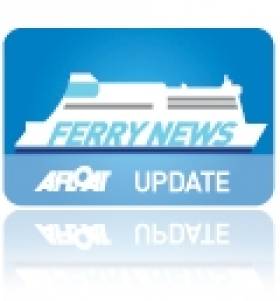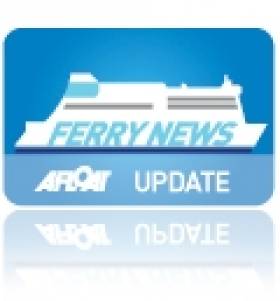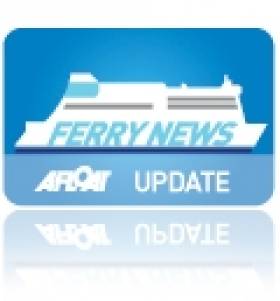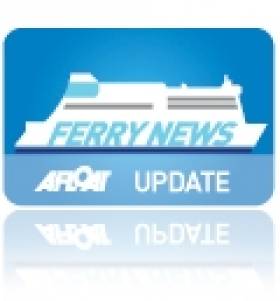Displaying items by tag: Condor Ferries
New Channel Islands Fast Ferry Starts 10,500nm Delivery Voyage to the UK
#Condor102 - Channel Islands operator Condor Ferries latest acquisition, Condor 102, departed last week from Austal's shipyard in Balamban, Cebu in the Philippines, to begin her long (approx. 10,500 nautical miles) delivery voyage to Southampton.
Upon her arrival in the UK, final preparations will be made before the 102-metre fast-ferry passenger and vehicle trimaran is scheduled to enter a Poole-Channel Islands service at the end of March 2015. She will be renamed following a public competition for islanders.
Afloat.ie adds that Condor 102 is understood to replace one of a trio of InCat built 86m fast-ferries which currently operate services in addition to ro-pax Commodore Clipper. This conventional ferry is a slightly larger version of Isle of Man Steam Packet Co.'s Ben-My-Chree.
Condor 102 which was built in Austal's yard in Fremantle, Western Australia was relocated to their facility in the Philippines from where for the past four months she underwent fitting-out to Condor's specifications so to meet passenger standards when entering service.
The craft is expected to take around four weeks to make the journey to the UK. During the voyage, which is being undertaken by Condor crews, the ferry will sail across the Indian Ocean, through the Suez Canal and via the Mediterranean before travelling up the Bay of Biscay and into the English Channel.
"I'm delighted that we are now entering the final stages of the new ferry's preparations before she is able to come into service on the UK to Channel Islands route," said Capt Fran Collins, Executive Director – Operations, at Condor Ferries.
Once she arrives in Southampton, interior refurbishment specialists, Trimline, will complete the internal fit out and the ferry will undertake further trials before she begins sailing in the Spring.
Channel Islanders Invited to Name New Condor 102m Fast-Ferry
#NameFastFerry - Channel Islands operator Condor Ferries is offering islanders the chance to win a prize by entering in a competition to find a name for their new fast-ferry due to enter service in Spring 2015.
As previously reported on Afloat.ie, the Condor 102m craft built by Austal of Fremantle, Australia, was acquired by Condor Ferries in August. The trimaran craft can accommodate 1,100 passengers and 250 cars.
Channel Islanders could win one year's free ferry travel, up to a value of £5000, for coming up with a name for the new ferry.
People who wish to take part, are being asked to write their idea on a piece of parchment that they can find in the Jersey Evening Post or Guernsey Press before either sending the entry in or posting it into one of the specially designed bottles that will be in St. Helier and St. Peter Port during peak Christmas shopping times.
The person who comes up with the best name according to the panel of judges, will also be invited to the VIP launch of the new ferry.
Entry forms for the competition can be found in yesterday's Jersey Evening Post and today's Guernsey Press.
"We really want to get islanders involved with the preparations for bringing the new ferry into service and felt that a competition to name the ship would be an excellent way to do this. I'm sure that there will be dozens of wonderful ideas submitted and we are all excited about finding out what the new name will be," said Alicia Andrews, Executive Director – Commercial at Condor Ferries.
#Channelislands – Channel Islands based operator, Condor Ferries which announced in August its acquisition of a new fast ferry, are now able to offer islanders to book sailings to the UK and France for journeys taking place up to 2 November 2015, following publication of new sailings schedule.
The schedule includes sailings on the new Condor 102, which will deliver a whole new on board experience, as well as more comfortable and more reliable travel for islanders sailing to and from the UK.
Islanders can now book sailings to both France and the UK right through to November next year, but it is the UK sailings which will really capture Islanders' imaginations," said Alicia Andrews, Executive Director – Commercial at Condor Ferries.
"From the end of March, all UK journeys will be on the new Condor 102 which offers smoother journeys, greater reliability and a superb on board experience including a wider choice of seating, a range of dining, and even shopping facilities for our passengers to enjoy.
"We are all very excited about the arrival of the Condor 102 and I'm sure that islanders and visitors will love sailing to the UK on our new ship."
Channel Islands Operator Condor Ferries Acquire 'Austal' State of the Art Fast-Ferry
#FastFerryPurchase – Channel Islands ferry operator, Condor Ferries which celebrates its 50th anniversary this year, has today announced acquisition of an Austal 102m state of the art 1,100 passenger / 250 car fast-ferry trimaran to enter service in Spring 2015, writes Jehan Ashmore.
Condor Ferries purchase of the Australian built fast-ferry which was built speculatively by Austal, is to secure the future of high-speed services between the UK and Channel Islands.
Austal based in Hendersen (Perth), Western Australia, also completed Irish Ferries Dublin-Holyhead fast-ferry, Jonathan Swift back in 1999.
Condor's new 35 knot MTU powered fast-ferry is to run services between the mainland Dorset port of Poole and the islands and compliments services also from Weymouth served by a pair of 86m fast-ferry craft built by rivals, InCAT based in Hobart, Tasmania.
James Fulford, CEO of Condor Ferries commented "I am delighted to announce that we are now proud owners of the Austal 102. This represents £50m of investment in our Islands and it will enable us to improve reliability, increase capacity, and give our guests a much greater level of comfort".
The good news follows a spate of negative publicity for the operator during the busy high-season. Last month their ro-pax ferry Commodore Clipper had an incident (making contact with the seabed) off Guernsey and which required the 500 passenger vessel to dry-dock at A&P Falmouth.
Progress to repair damage to the 14,000 tonnes ferry Commodore Clipper have been better than expected as work is now completed and she is to return to service earlier than scheduled this weekend on Portsmouth routes to St. Peter Port, Guernsey and St. Helier on Jersey.
During the absence of Commodore Clipper, the only conventional ferry serving the islands, Condor were forced to charter in a pair of vessels, albeit freight-only vessels, MN Toucan and Arrow to compliment their fast-ferry operations serving to and from Poole and Weymouth.
As previously reported on Afloat.ie, the Arrow, which too is on charter from Seatruck Ferries to the Isle of Man Steam Packet, had the misfortune of also getting into difficulties arising from a fault of the system controlling one of her propellers when sailing to Guernsey. Disruption to the Arrow was resolved within 24 hours of the fault occuring having undergone repairs carried out in Portsmouth.
Guernsey headquartered Condor Ferries also run a third InCAT built 86m ferry craft that links the islands to St. Malo, France. The Breton port is also where their ro-ro freight-ferry, Commodore Goodwill provides another lifeline bringing goods to and from the islands and also connecting the UK.

































































